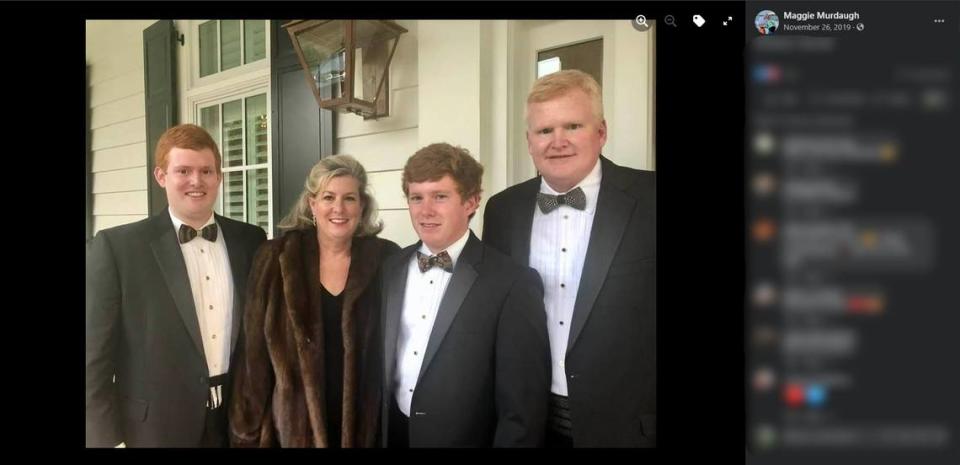Another Murdaugh tragedy. Another reason to lose faith in the criminal justice system
It seems unreal, like something from a William Faulkner novel.
Two members of the Murdaugh family were found shot to death last week deep in the piney heart of South Carolina’s 14th judicial circuit, which the Murdaughs ruled for nearly a century.
Paul Murdaugh, 22, and his mother, Margaret Kennedy “Maggie” Murdaugh, 52, were shot with two types of weapons on Monday night at a family place outside Varnville.
Three days later, the family patriarch, Randolph Murdaugh III, 81, died at his Hampton County home, apparently of natural causes, a day before a graveside service was held for his grandson and daughter-in-law.
Paul Murdaugh, whose great-grandfather and great-great-grandfather also were 14th Circuit solicitors, was facing one count of boating under the influence causing death and two counts of boating under the influence causing great bodily injury from a crash near Parris Island in February 2019.
It was hoped a trial would bring justice and accountability in the death of 19-year-old Mallory Beach.
What we don’t know about these cases would fill a thick book. But we do know this: The Murdaugh boy never faced justice in the drunken boat crash that rocked the Lowcountry.
He was killed days after a lengthy, court-ordered mediation session failed to resolve a civil suit stemming from the boat crash.
The shootings are mysterious because the so-called criminal justice system has made them that way.
Again.
Accountability is missing
As of Friday, authorities had released only sketchy, confusing tads of information that did more to confuse than clarify.
Why would law enforcement say the community at-large had nothing to fear after two people were gunned down on their private property? And at the same time, give a phone number for people to call with information, indicating they don’t know who did it and where that suspect or suspects may be.
The list of unknowns is needlessly long, especially when the law demands public information be released to the public, and when that information involves basic public safety.
But one thing we do know about the Murdaugh case is that it has eroded public trust in the criminal justice system.
Paul Murdaugh got special treatment from the first horrific moments in the fatal boat crash case.
The 911 dispatch system proved to be a joke.
The coordination of investigative organizations was abysmal.
The lawyers immediately injecting themselves in the case at the hospital were Paul Murdaugh’s father, Richard Alexander “Alex” Murdaugh, a part-time prosecutor with the 14th Circuit Solicitor’s Office, and his grandfather, Randy Murdaugh, who was the solicitor for two decades.
When the young man finally faced a day in court, his arrest after pleading not guilty proved to be what columnist Liz Farrell, who was there, said was “like a summer intern” version of arrest.
Authorities claimed it was because the charges came in a “direct indictment,” but let’s list all the other suspects we’ve seen who never cross the doorstep of the jail, and whose “mug shot” is taken in street clothes in a courthouse hallway.
Whether powerful insiders can dodge accountability we’ll never know.
In a just world, Paul Murdaugh would already have faced trial and been judged by a jury.
South Carolina puts lost trust on steroids by letting criminal cases dangle unattended for years as memories fade, witnesses die, and evidence disappears.
Guarantee a speedy trial
We need a hard deadline to try every case.
Eight months would be plenty of time for due process to run its course. A hard deadline would ensure that victims are afforded a basic right to a speedy resolution. A date-certain is needed for each case to go to trial, ready or not, come hell or high water.
Court officials say they are overburdened, and I’m sure they are, but that tends to happen when cases are extended ad nauseam. And only a minuscule percentage of criminal cases ever go to trial.
An ironclad guarantee for a speedy trial would be one way for the criminal justice system to regain public trust.
Another would be to release public information to the public in a timely, accountable way.
What has happened to the Murdaugh family is sadder than sad.
But it is sadder still when the public loses faith in the criminal justice system.
David Lauderdale may be reached at LauderdaleColumn@gmail.com.

 Yahoo Finance
Yahoo Finance 


